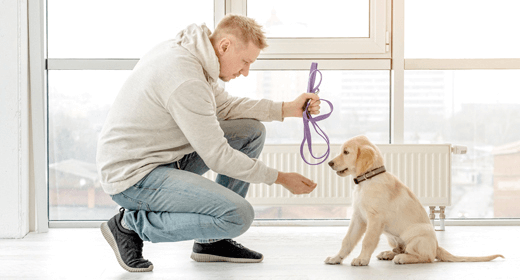

Bringing a furry friend home is one of the greatest things you will do. If you are someone who has been longing for a furry companion, you should wait no more... however, only if you are confident that you can take complete care of this four-legged angel. Puppies need love and care, so as their caregivers, you need to help them grow into happy and healthy dogs.
Stay by your pet’s side throughout its growing stage. This is that time of its life where you need to do more than just provide food, love, and fun times; you must understand dog nutrition, follow the vaccination schedule, and potty train your puppy. Sparing some time and energy to provide your pet with basic puppy care can help you build a loving relationship with your pooch. So, let us explore a few things you can look into while nurturing a puppy. This basic puppy care guide will also keep you informed with what to expect in the first few months of being a caregiver.
Wondering what to know about taking care of a puppy? Let us start with the most basic things like puppy proofing your house. That is right. Puppies and babies fall in the same category: delicate and fragile! You need to be careful about their surroundings and make sure that there is nothing hazardous around. Puppies are naturally curious. Make sure they do not encounter things like chemicals, electrical cords, harmful houseplants, valuables, and especially breakables. You also need to get necessary pup supplies like a feeding bowl, collar, leash, and more. Set up a cosy corner for your puppy to rest in!
Choosing the right puppy food is of paramount importance. You must pick out puppy food that is specifically formulated for growing puppies as it needs the right kind of nutrients to grow stronger. So, avoid adult dog food if your pet is still a pup.
Not sure when to make a switch to adult dog food? Well, it totally depends on the breed size. If you have a small or medium breed dog, you can switch to dog food once it turns 9 to 12 months old. If you have a large breed dog, continue feeding puppy food until it turns 12 to 24 months old. Apart from that, make sure your pup always has access to fresh and clean water!
This is what a typical puppy feeding schedule would look like:
At IAMS™, we offer a range of puppy as well as adult dog food that nourishes your furry friend with vitamins, minerals, proteins, and other essential nutrients. Our products are made with premium-quality ingredients to ensure that your dog enjoys every bite of its food.
Taking your furry friend to the vet is the most important part of taking care of a puppy. Your dog’s first visit to the vet will help you learn about your dog’s overall physical health. Vet visits will also keep you informed about the vaccination schedule. In fact, it is recommended to make a list of all questions that you may have. This list should include topics like:
Puppies should meet a variety of different people, dogs, objects, and situations – all in a positive way. The most important time for pups to socialize is between three and 12 weeks of age, however, it should continue throughout a puppy’s development. As pet parents, you can take your pooch to puppy classes as it provides a great opportunity to socialise puppies.
You can get started with potty training from the day one. This will help inculcate basic bathroom manners in your dog and will save you from cleaning the floor every time your pooch excretes. So, pick a bathroom spot outside your house and take your pup to the same place whenever it is potty time. Praise it right after it is done. You can also reward it with treats. However, under no circumstances must a puppy be yelled at since it may ignite fear.
The best way to train is to reward good behaviour and ignore unwanted behaviour. It is never too early to begin training a puppy, but owners must remember that very young puppies become tired or distracted easily so training sessions should be kept to a short duration.
Dogs are prone to losing tooth, bad breath, and periodontal diseases. Moreover, they are good at hiding their dental pain. Hence, owners should introduce some form of oral care for their puppy as early as possible. Consult your vet to ensure that you pick the best dental care option for your pooch.
Amounts of exercise should be controlled for puppies during growth. They should not be forced to exercise beyond the amount of time they would engage in with another puppy of the same age. Moreover, your furry friend must be allowed to rest when they need to. So, instead of offering a one long playtime period, go for two short walks.
Every first-time dog parent must know the following tips to take care of a puppy:
Puppies are full of energy. And they can drive you crazy if their energy isn’t utilized. Hence, make sure that you train and exercise with your baby dog every day. Go for walks, play fetch, and praise it for good behavior. This will condition your puppy to think that good behavior is rewarded.
Dogs do not know how to live in a house. As dog parents, we need to teach them some basic manners. Start by teaching your pet its name and then move on to potty training. Dogs are social beings; hence, do not forget to teach your dog to stay calm and polite in public places.


You want to take your new puppy out for a stroll; now, all you need to do is train him to walk on a leash. Watch as Expert Pet Trainer Kathy Santo show you how to walk your new family member.
Hi, I'm Kathy Santo with IAMS, and today we're going to talk about how to leash train your puppy. Once your puppy is around eight weeks old, you can begin leash training. The first thing you'll need is a collar or harness that fits your puppy appropriately, never too lose or too tight. You should be able to fit two fingers between the collar and your puppy's neck. When deciding between using a collar or a harness, there are a few things to consider. Does your puppy have any respiratory issues? Does your puppy pull when being walked on leash? Use a harness or head halter if your puppy pulls on leash, or has respiratory problems. Before you can jump right into training, you'll need to get your puppy used to wearing a collar and having the added weight of a leash. The best thing to do is have him wear the collar or harness and leash around the house, so he becomes used to the feeling. Be sure to keep an eye on your puppy to make sure he doesn't get trapped, caught, or accidentally injured. If your puppy is noticeably struggling, or looks scared, start off with a shoelace, or a small piece of rope, so he can get used to dragging only a little something around. This will help him get used to the added presence and weight of a collar and leash. Now for walking on a leash. The leash should have some slack, because when you put pressure on a dog, their natural reflex is to move or pull in the opposite direction. If you find that your puppy is afraid of walking with the leash, try placing treats along the route you know you'll be walking, to give him the notion that good times are ahead. That way, he learns to focus on what's ahead of him with curiosity, and not fear. As you begin walking your puppy, you will notice that your pace will sometimes have to be faster than you expect to retain slack in the leash. The more you work with your puppy, the quicker you'll be able to train him to slow down, while maintaining the needed slack. As you walk around, begin incorporating specific commands for your puppy. Basic commands include sit, stay, and heel, or let's go. Do your best to remain consistent with your commands, and guide your puppy through the learning process. For example, when you say sit, guide your puppy to sit until the command is recognized by the puppy. When you say heel, make sure your puppy is obeying your command before you start walking again. When your puppy starts to move ahead too quickly, come to a complete stop and wait for him to cease pulling before going forward. Practice his stop and go, never allowing your puppy to dictate your pace. If your puppy continues to pull on his leash, ask him to change directions, while saying 'turn.' This will condition your puppy to always look for you for direction, instead of him feeling like he can dictate where the two of you go next. I also like to run backward, and then switch to a different direction. This gets your puppy excited about chasing you. Remember to reward your puppy when he does the right thing, so that he begins to understand what you're asking him for. If your puppy still isn't catching on, try upgrading your treats, practicing in an area with fewer distractions, or working on more basic commands. Leash training takes time and patience. Both you and your puppy may get frustrated during the learning process. Do your best to avoid tugging. It's not fair to correct them for something they don't understand. As your dog enters adolescence, and clearly knows the difference between right and wrong, it's OK to give a slight occasional tug on his leash, if he insists on being difficult. If you remain patient and consistent with your puppy, he'll be leash trained in no time. I'm Kathy Santo with IAMS, and I hope that you found this helpful as you welcome your new addition to your family.